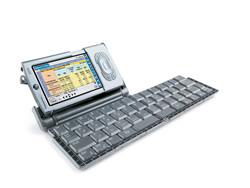Microsoft launched Windows XP Media Center Edition 2004 yesterday with Microsoft Group Vice President Jim Allchin announcing the products new feature and new manufacturing partners. This follows their first release of PC as TV, PVR, DVD, photo displaying, music playing media hub in October 2002, which had a lukewarm reception and was felt by many more as a show of intention to be involved rather than a fully considered product.
As the Media Center Edition (MCE) is expected to be used in the lounge from a couch, without keyboard and mouse, one of the big focuses of is giving the viewer the ability to control all of the media functions via the remote control. Many of the previous functions and some of the new features are available via a single key press, such as ability to control the newly included FM radio, by selection favourite stations and skipping back seven second if you misheard something. The selection, rotation and display of photos and the manipulation of music has also been made easy using the report control.
A full list of the MCE functions are described in detail at the dedicated Website as are details on how to obtain an upgrade for the previous version.
Online Spotlight – A new channel for content
Microsoft have recognised that just giving people the ability to record their own content, TV programmes or radio is only part of the story. The real excitement lies in the new universe of digitised media that will become available. To this end they have launch Online Spotlight, an online guide created specifically for Media Center Edition PC customers that offers a central location for them to find the latest third- party services and software, such as music, movie trailers, news updates and even Karaoke.
The initial content providers include CinemaNow, Movielink and Napster, but sadly these will only be available with the United States.
Hardware supply partners
There are more than 40 original equipment manufacturers (OEM) planning to ship Media Center Edition PCs to consumers in Asia, Canada, Europe and the United States and China on the list of later this fall. Product pricing will vary for each manufacturer and market, but will start at below $1,000.
Two of the biggest new names are Dell and Sony with Dell reporting that they’re taking order online today and Sony shipping two new models of VAIO Media Center PCs in the next few weeks. Sony, who have already developed and currently market their own equivalent product, appear to be covering their bases.
HP and Toshiba continue their strong support and are the only two companies offering product in three major Continents – Asia, Europe and America with many of the newly announced companies choosing to offer in individual countries.
Of the announced supplier, Japan will have the widest selection of suppliers, numbering five, although interestingly Sony has decided not to sell it there, choosing the United States and Canada instead. The US and Germany will have four suppliers and Korea, the United Kingdom and France having three a piece.
It sounds like Microsoft have listen to their previous customer and have adopted many of their ideas, time will tell whether they have been successful and we are looking forward to finding out.
Microsoft Windows XP Media Center Edition 2004 site
 Palm have released three new models, the Tungsten E, the very iPod-looking $99 Zire 21 and the one we find most interesting, the Tungsten T3.
Palm have released three new models, the Tungsten E, the very iPod-looking $99 Zire 21 and the one we find most interesting, the Tungsten T3.